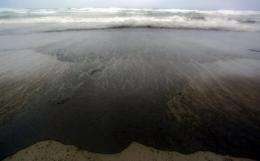An oil slick stains a New Zealand beach in 2011. Sri Lanka mobilised 500 volunteers on Friday to prepare for an oil slick heading towards its coast after a cargo vessel sank off-shore due to bad weather, a disaster official said.
Sri Lanka mobilised 500 volunteers on Friday to prepare for an oil slick heading towards its coast after a cargo vessel sank off-shore due to bad weather, a disaster official said.
The rusting 15,000-tonne Thmothrmopolyseara, a Cyprus flag carrier, took in water and went down late Thursday after remaining in anchorage for over three years following a dispute over its cargo of steel, local officials said.
"Much of the furnace oil in the ship had been pumped out, but we were told about 70 tonnes of fuel remained in its tanks and that is causing a slick," Disaster Management Centre director Sarath Kumara told AFP.
He said the slick measuring about 10 kilometres (six miles) long was about 20 kilometres (12 miles) off Sri Lanka's western coast, but could get washed ashore due to heavy monsoon weather.
"We have arranged small units of volunteers to clean up a coastal stretch of over 50 kilometres," Kumara said. "We have not experienced anything like this before."
The coast line from Mount Lavinia, a popular tourist resort just south of the capital Colombo, and Negombo, the first beach resort opened for tourism in the early 1970's, was at risk, the DMC said.
The foreign vessel had been detained by Sri Lankan courts following litigation over the cargo of steel valued at over $300 million, according to local media reports. It was not immediately clear who owned the vessel.
Sri Lanka's merchant shipping authority director Ajith Seneviratne said they were ready to tow the ship away to a salvage yard in the island's east, but were prevented by a court order against the removal.
"We knew that the ship could go down as the monsoon intensifies and we had pumped out most of the 600 tonnes of furnace oil it carried, but there was a residue that we could not pump out," Seneviratne said.
(c) 2012 AFP























